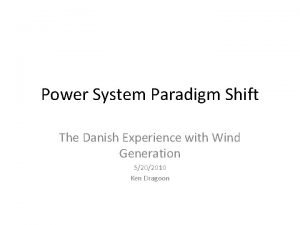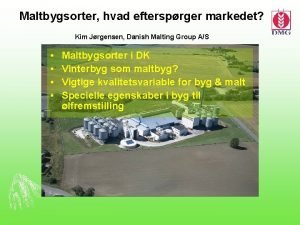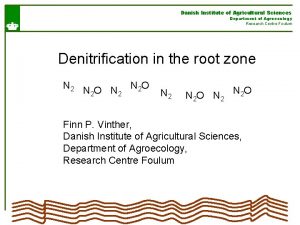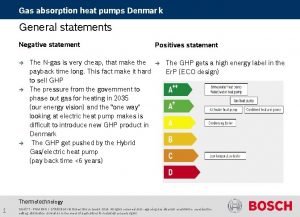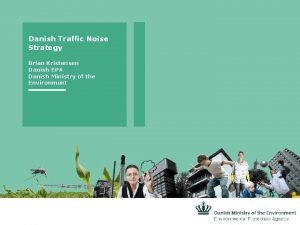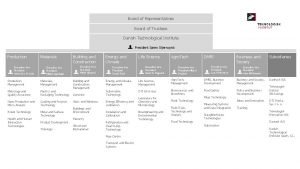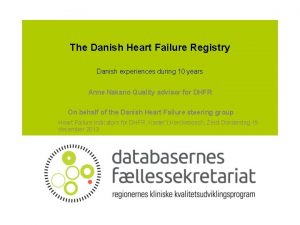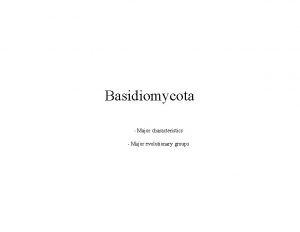Revision 2014 Danish Major Revision And implementation of

















- Slides: 17

Revision 2014 Danish Major Revision And implementation of ESA 2010 By Annette Thomsen, Project Coordinator Presented by Søren Brodersen

Structure of presentation • Background • Organisation • ESA 2010 – conceptual changes • First estimates of effect of conceptual changes

Background The Danish National Accounts System • is very detailed: e. g. General Government Sector subsystem has around 75. 000 entries per year; production accounts based on detailed commodity flow system (2. 300 commodities; 120 industries; 3 different price levels; constant and current prices)

Background • Seeks full coordination between: – Quarterly and annual accounts – GFS statistics and national accounts – Financial and non financial accounts – Balance of payments and financial and non financial accounts – Employment statistics and production accounts • All national accounts time series are open for revision

Organisation • Expected results – In September 2014, we can publish revised national accounts according to ESA 2010/SNA 2008 – Distinguish between data- and methodological and conceptual changes for at least one year (2008) – Submit national accounts data according to ESA 2010/SNA 2008 to Eurostat/OECD/UN and national users – Documentation of results – Improved and standardised calculation systems

Organisation • The revision is organised as a project called ”Revision 2014” • The project is carried out by the National Accounts Division, Government Finance Division and Foreign Trade Division • There has not been established a separate unit • Normal production and publication rhythm during the project

Organisation of Revision 2014 Steering Group Reference Group Project Coordinator Coordination Groups (Internal) Foreign Trade and Bo. P National Accounts Coordination Groups with Central Bank Government Finance Financial Accounts

Organisation • Composition and Role of Steering Group: – Director of Economic Statistics (Chairman), Project Coordinator, Head of Divisions of: National Accounts; Government Finance Statistics; Foreign Trade – Make decisions regarding areas of revision, resources, timetables and methods – Meet once every month

Organisation • Composition and Role of Reference Group: – Steering Group plus Heads of Divisions of: Macro Economic Models; Price Statistics; Labour Marked Statistics; Agricultural Statistics; Business Statistics; Statistics produced by Central Bank – Members are not directly involved, but have an interest in following the project – Meet two times every year

Organisation • Role of project coordinator – Organise collection of short written description of all proposed revision projects prior to decision by Steering Group – Coordinate sub-projects, that affect more than one division – Secretary for the Steering Group • Role of Coordination Groups – The practical side e. g. data-exchange, content of revisions, timetables – Chaired by project coordinator (except with CB)

Overall planning - Phases

Organisation – Phase 1: Data- and methodological revisions • 1. 1 Identification, delimitation and decision of number of data- and methodological revisions • 1. 2 Execution of revisions • 1. 3 Quality assurance • 1. 4. Evaluation of effect of data- and methodological revisions

Data- and methodological revisions (examples) • ”Simple” calculation errors • Incorporation of new sources in level and not just growth rates (e. g. dwellings) • Improvement of estimation methods (e. g. foreign affiliates in insurance)

Organisation – Phase 2: Conceptual changes (ESA 2010/SNA 2008) • 2. 1 Identification and delimitation of conceptual changes • 2. 2 Agreement of calculation methods • 2. 3 Incorporation of conceptual changes in the national accounts • 2. 4 Quality assurance • 2. 5 Evaluation of results of total conceptual changes

ESA 2010 - Conceptual changes (examples) • New guidelines for: – Volume indicators for individual government consumption (e. g. health and education) – Military expenditures – Employers’ pension schemes – Goods for processing

ESA 2010 – conceptual changes and data transmission • Work still going on: – Research and development – to be capitalised? (in Denmark, yes) – FISIM – not yet an agreed method • Transmission of data to EU still discussed – Earlier and more detailed sector accounts – Non-profit institutions serving households (NPISH) to be transmitted as a separate sector and not with households

Estimated effect of ESA 2010 on GDP and GNI Pct. in 2006 GDP GNI (1) Pension schemes 0, 01 (2) Research and 1, 80 development (3) Military expenditure 0, 05 1, 77 (4) Other 0, 34 -0, 42 0, 36 -0, 43 (5) Total 2, 20 -2, 27 2, 18 -2, 26 0, 05
 Active revision vs passive revision
Active revision vs passive revision French east india company
French east india company Denmark airspace
Denmark airspace Setting of the story of beowulf
Setting of the story of beowulf Den maritime fond
Den maritime fond The danish experience
The danish experience Maltbygsorter
Maltbygsorter Danish pastry pronunciation
Danish pastry pronunciation Danish institute of agricultural sciences
Danish institute of agricultural sciences Danish labour supply
Danish labour supply Danish language
Danish language Danish diaphragm pump
Danish diaphragm pump Fiunet
Fiunet Danish diet
Danish diet Danish epa
Danish epa American school system compared to danish
American school system compared to danish Danish technological university
Danish technological university Encoding
Encoding





